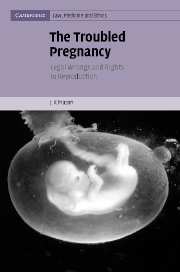Book contents
- Frontmatter
- Contents
- Preface
- Table of cases
- Table of statutes
- 1 The nature of the troubled pregnancy
- 2 Voluntary and involuntary termination of pregnancy
- 3 Antenatal care and the action for wrongful birth
- 4 Unsuccessful sterilisation
- 5 Uncovenanted pregnancy and disability
- 6 Wrongful neonatal life
- 7 The management of the disabled neonate
- 8 Conclusion
- Bibliography
- Index
7 - The management of the disabled neonate
Published online by Cambridge University Press: 19 July 2009
- Frontmatter
- Contents
- Preface
- Table of cases
- Table of statutes
- 1 The nature of the troubled pregnancy
- 2 Voluntary and involuntary termination of pregnancy
- 3 Antenatal care and the action for wrongful birth
- 4 Unsuccessful sterilisation
- 5 Uncovenanted pregnancy and disability
- 6 Wrongful neonatal life
- 7 The management of the disabled neonate
- 8 Conclusion
- Bibliography
- Index
Summary
Introduction
As Hale LJ said in her memorable speech in Parkinson:
[T]he invasion of the mother's personal autonomy does not stop once her body and mind have returned to their pre-pregnancy state … The obligation to provide or make acceptable and safe arrangements for the child's care and supervision lasts for 24 hours a day, seven days a week, all year round, until the child becomes old enough to take care of himself.
And, if that be true of the normal child – and probably most of us would agree that it is – how much more does it apply to one who is disabled? Indeed, this compelling passage from Lady Hale convinces me that a study of the troubled pregnancy is incomplete without a consideration of its medico-legally most important aftermath – that is, the management of congenital disease. Thus, the rationale of this chapter, lies in the belief that there is a practical, as well as a conceptual, continuum between pregnancy and early motherhood. Given this premise, however, it will be appreciated that our remit can legitimately cover only those conditions which were present in utero or those in which the seeds of disablement were sown during fetal life – or, put another way, we will be considering only the child whose disability was foreseeable before he or she was born. As a corollary, we are not concerned directly with non-congenital diseases of childhood but we will use such cases when they are needed to illustrate a relevant point.
- Type
- Chapter
- Information
- The Troubled PregnancyLegal Wrongs and Rights in Reproduction, pp. 241 - 296Publisher: Cambridge University PressPrint publication year: 2007



